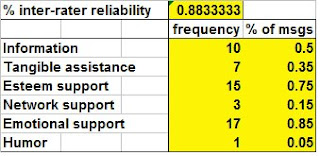We replicated this study (on a much smaller scale) by analyzing 20 messages in an online support community for those with Spinal Cord Injuries (SCI). We also included the additional cateogry of humor as a type of support. The chart below indicates our results after observing messages on three different threads. The agreement of our individual analyses (inter-related reliability) was 88.3% (88.33333%).


The three support categories that were most often found in the messages analyzed in the Braithwaite et. al study were emotional support, information, and esteem support. These three categories were also found most frequently in the responses we analyzed in the SCI online community. However, while Braithwaite et. al found the percentages to be 40, 31.3, and 18.6 respectively, our percentages for the three categories overall were much higher: 85, 50, 74 percent. Additionally, information was the lowest of the three categories in our personal study. Unlike the Braithwaite study, we found a much larger incidence of tangible assistance, as demonstrated when users offered their screen name or phone number the person in which they were replying so that they coudl have more direct contact.
One reason for these differense in the choice of subject matter. We focused on a distinct disability (spinal cord injuries) rather than disabilities in general, as noted in the study. The Braithwaite study states that "the less control you have over the disability, the more emotional support is given." This aspect greatly applies to spinal cord injuries because patients do not have any control over the accident, and once an injury is sustained, there are very limited physiological fixes. (Compare this to something such as depression, which can be fixed by different types of medication, counseling, etc.). Also, a higher percentage of tangible assistance may have been found because many of the users wheelchair bound and may choose to have more contact with other persons in similar situations.
One reason for these differense in the choice of subject matter. We focused on a distinct disability (spinal cord injuries) rather than disabilities in general, as noted in the study. The Braithwaite study states that "the less control you have over the disability, the more emotional support is given." This aspect greatly applies to spinal cord injuries because patients do not have any control over the accident, and once an injury is sustained, there are very limited physiological fixes. (Compare this to something such as depression, which can be fixed by different types of medication, counseling, etc.). Also, a higher percentage of tangible assistance may have been found because many of the users wheelchair bound and may choose to have more contact with other persons in similar situations.
Also, we only analyzed 20 messages, whereas the Braithwaite study analyzed 1472. Since we didn't use the same number of messages, we don't know if we would have had the same results.
Furthermore, 16 of the messages analyzed were a part of the same thread on a single message board. The original post was "I would like to be able to talk to people with similar situations on a on-line chat room if possible." The variety of messages may have been limited because they were all related to the very same request.
Furthermore, 16 of the messages analyzed were a part of the same thread on a single message board. The original post was "I would like to be able to talk to people with similar situations on a on-line chat room if possible." The variety of messages may have been limited because they were all related to the very same request.
Our findings also supports Walther's theory regarding online community support. Walther defines four factors of online communities: social distance, anonymity, interaction management, and access. Within the online communities we researched, three of four of the factors were certainly present. It was clear that social distance, anonymity, and access were contributing factors in individual posts and replies. The amount of experts on the forums were substantial when compared to what these potentially immobile individuals would have in FtF reach. Secondly, the CMC communication gave the posters as much or as little anonymity as they desired. For example, one poster known only as “friend” had lots of great information but we knew nothing about him/her. Other users posted their phone numbers, email addresses, or even personal WebPages. Lastly the access to this online community was unlimited. It could be accessed any time during the day and as much as one so desired.
In conclusion we came to the agreement that these findings do not support Wallace’s predictions. Much support was offered to each one of these individuals despite there being a large volume of people online. Although going back to the subject matter, it is a touchy subject people get very upset about. If we were to examine a less touchy subject perhaps not so many individuals would offer such support.
No comments:
Post a Comment